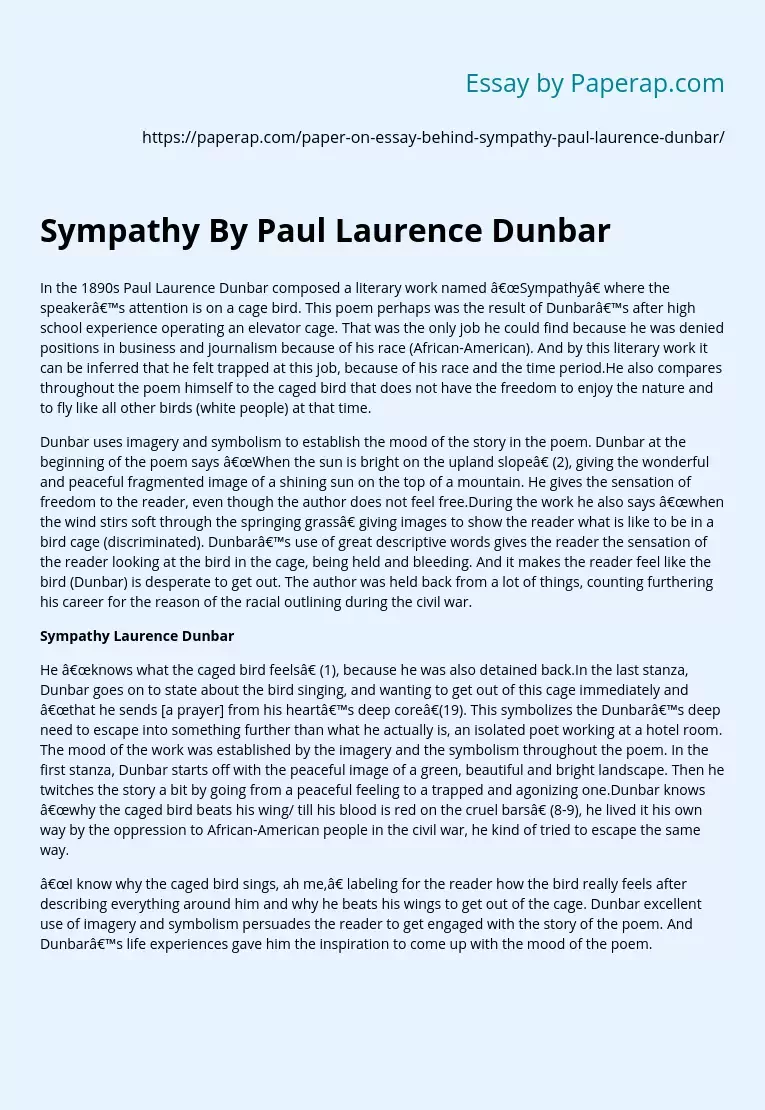Sympathy By Paul Laurence Dunbar
In the 1890s Paul Laurence Dunbar composed a literary work named “Sympathy” where the speaker’s attention is on a cage bird. This poem perhaps was the result of Dunbar’s after high school experience operating an elevator cage. That was the only job he could find because he was denied positions in business and journalism because of his race (African-American). And by this literary work it can be inferred that he felt trapped at this job, because of his race and the time period.
He also compares throughout the poem himself to the caged bird that does not have the freedom to enjoy the nature and to fly like all other birds (white people) at that time.
Dunbar uses imagery and symbolism to establish the mood of the story in the poem. Dunbar at the beginning of the poem says “When the sun is bright on the upland slope” (2), giving the wonderful and peaceful fragmented image of a shining sun on the top of a mountain.
He gives the sensation of freedom to the reader, even though the author does not feel free.During the work he also says “when the wind stirs soft through the springing grass” giving images to show the reader what is like to be in a bird cage (discriminated). Dunbar’s use of great descriptive words gives the reader the sensation of the reader looking at the bird in the cage, being held and bleeding. And it makes the reader feel like the bird (Dunbar) is desperate to get out.
The author was held back from a lot of things, counting furthering his career for the reason of the racial outlining during the civil war.
Sympathy Laurence Dunbar
He “knows what the caged bird feels” (1), because he was also detained back.In the last stanza, Dunbar goes on to state about the bird singing, and wanting to get out of this cage immediately and “that he sends [a prayer] from his heart’s deep core”(19). This symbolizes the Dunbar’s deep need to escape into something further than what he actually is, an isolated poet working at a hotel room. The mood of the work was established by the imagery and the symbolism throughout the poem. In the first stanza, Dunbar starts off with the peaceful image of a green, beautiful and bright landscape. Then he twitches the story a bit by going from a peaceful feeling to a trapped and agonizing one.Dunbar knows “why the caged bird beats his wing/ till his blood is red on the cruel bars” (8-9), he lived it his own way by the oppression to African-American people in the civil war, he kind of tried to escape the same way.
“I know why the caged bird sings, ah me,” labeling for the reader how the bird really feels after describing everything around him and why he beats his wings to get out of the cage. Dunbar excellent use of imagery and symbolism persuades the reader to get engaged with the story of the poem. And Dunbar’s life experiences gave him the inspiration to come up with the mood of the poem.
Sympathy By Paul Laurence Dunbar. (2019, Dec 05). Retrieved from https://paperap.com/paper-on-essay-behind-sympathy-paul-laurence-dunbar/

